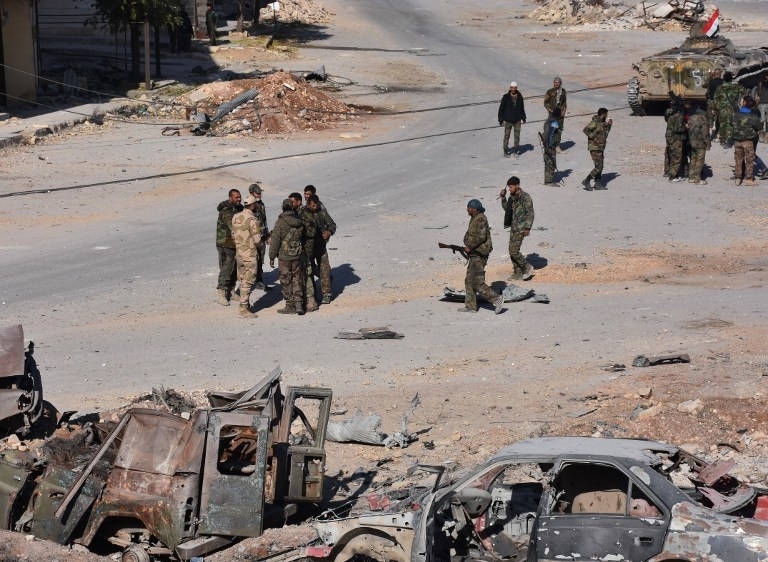Aid corridors now open in Syria's Aleppo: Lavrov

Russia's Foreign Minister Sergei Lavrov said on Friday that convoys of humanitarian aid are able to pass safely into the besieged Syrian city of Aleppo.
"We have informed the UN in New York and Geneva that there is no longer a problem with the delivery of humanitarian cargo to eastern Aleppo," he told reporters in Rome, according to a RIA Novosti news agency transcript.
Russia has previously decreed the establishment of humanitarian corridors, but the UN has never used them for lack of security guarantees.
Speaking alongside his Italian counterpart Paolo Gentiloni, Lavrov said approval from the Syrian government of President Bashar al-Assad remained essential.
Assad's government has been conducting an offensive on the battered northern city since 15 November, spurring a mass exodus.
"It is necessary to agree with the Syrian government on the passage of these convoys, which are no longer threatened," RIA Novosti quoted the top diplomat as saying.
"The UN is still thinking about how it could be done," he added.
Russia, Assad's main ally, on Thursday proposed setting up four humanitarian corridors into east Aleppo to bring in aid and evacuated severely wounded people.
Moscow, however, was criticised at the UN Security Council meeting on Syria on Wednesday, with British ambassador Matthew Rycroft accusing Russia of supporting "a deliberate act of starvation and a deliberate withholding of medical care."
Since Saturday, more than 50,000 people have poured out of east Aleppo into territory controlled by government forces or local Kurdish authorities, according to the Syrian Observatory for Human Rights.
More than 300 civilians, including dozens of children, have been killed in east Aleppo since the government offensive began, according to the Observatory.
Urgent appeal
Meanwhile, more than 200 humanitarian and human rights groups called on Thursday for the UN General Assembly to address Syria's deadly conflict, citing the Security Council's paralysis in dealing with the crisis.
In a declaration published in New York, the 223 signatories said the Security Council "has failed Syrians" and particularly pointed out its inability to stop the Syrian government's offensive against east Aleppo.
They called for the 193 member nations of the United Nations "to request an emergency special session of the UN General Assembly to demand an end to all unlawful attacks in Aleppo and elsewhere in Syria, and immediate and unhindered humanitarian access" to besieged civilians.
The UN members also should find a way to bring those responsible for serious crimes under international law in Syria to justice, the declaration said.
Under a 1950 resolution dubbed "Uniting for Peace", the General Assembly adopted the authority to skirt the Security Council when it proves incapable of preserving peace and international security.
The resolution has been invoked eight times in efforts to resolve crises where the Security Council is at impasse, such as in the Korean crisis in 1950, the Congo in 1960 and Afghanistan in 1980 following the Russian invasion.
But the powers of the resolution are limited, and its results have been mixed.
Security Council impasse
Since the Syrian conflict began in March 2011, Russia has wielded its Security Council veto on Syria-related resolutions five times, and China has done so four times.
Unlike the 15-member Security Council, there is no veto in the General Assembly, but its decisions are not binding.
The General Assembly, however, can put pressure on countries to act unilaterally: an assembly resolution in 1981, for example, spurred certain countries to impose sanctions on apartheid-era South Africa.
The initiative on Thursday by civil society organisations joins an effort launched by Canada, which has already mobilised 73 countries to demand an emergency special session of the General Assembly on Syria.
That meeting should be held "at the earliest opportunity, as UN member states have done in the past when the Security Council was deadlocked", the organisations said.
Among the groups from 45 countries that signed the declaration are Amnesty International, Human Rights Watch, Oxfam, CARE International, Save the Children and 63 Syrian organisations.
France, which has gathered the support of about 100 countries, is spearheading a movement aimed at linking Security Council veto power to moral issues.
The veto should not be used in cases of mass atrocities, when the need for action is urgent, the French government argues.
Stay informed with MEE's newsletters
Sign up to get the latest alerts, insights and analysis, starting with Turkey Unpacked
Middle East Eye delivers independent and unrivalled coverage and analysis of the Middle East, North Africa and beyond. To learn more about republishing this content and the associated fees, please fill out this form. More about MEE can be found here.




